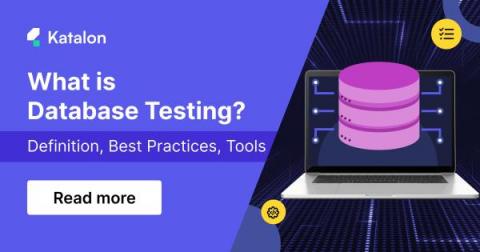Systems | Development | Analytics | API | Testing
%term
Database Testing: A Full Guide
Database testing is the process of evaluating the accuracy, reliability, and performance of a database system. Its purpose is to ensure that the data stored there is consistent, valid, and can be correctly manipulated for business needs. The components to be tested are usually database schema, tables, and database triggers. Testers leverage SQL queries, data comparison tools, automation frameworks, or load testing tools to examine the data integrity, validity, security, performance, and structure.
15+ Best ChatGPT Prompts for Software Testing
We’ve got something truly special in store for you. We reached out to our expansive testing community, consisting of 40,000 testers, and posed a question about leveraging GPT prompts for various software testing scenarios and tips for effective prompting. The response was nothing short of astounding, and today, we’re thrilled to bring you the incredible insights we gathered. Prepare to be amazed as we unveil 15+ best ChatGPT prompts for software testing enthusiasts like you.
A Complete Guide To AI/ML Software Testing
There is no doubt about it: Artificial Intelligence (AI) and Machine Learning (ML) has changed the way we think about software testing. Ever since the introduction of the disruptive AI-powered language model ChatGPT, a wide range of AI-augmented technologies have also emerged, and the benefits they brought surely can’t be ignored. In this article, we will guide you to leverage AI/ML in software testing to bring your QA game to the next level.
Definitive Guide to SaaS Reverse Trials
In the world of software-as-a-service, product-led growth (PLG) is an easy way to enable users to experience the value of a product firsthand, without restrictions. PLG can drive adoption, retention, and sustainable business growth with its robust and open framework. But what drives PLG best, a freemium model or a free trial? With freemium, your top of funnel growth can skyrocket, while free trials see a 2-3x higher conversion rate thanks to urgency (ie, users lose access immediately on trial end).
Snowpark ML: The 'Easy Button' for Open Source LLM Deployment in Snowflake
Companies want to train and use large language models (LLMs) with their own proprietary data. Open source generative models such as Meta’s Llama 2 are pivotal in making that possible. The next hurdle is finding a platform to harness the power of LLMs. Snowflake lets you apply near-magical generative AI transformations to your data all in Python, with the protection of its out-of-the-box governance and security features.
Snowflake Schemas vs Star Schemas: 5 key differences
Paws and Pixels: How tails.com's data transformed dog-centric delights
Dockerfile Deployment on High-Performance MicroVMs is GA
Today, we are excited to announce the support of Dockerfile based deployments in general availability. You can now deploy any GitHub repository that contains a Dockerfile across all our locations worldwide. It can be used to deploy APIs, full-stack applications as well as workers with no extra cost. Building and deploying using Dockerfiles offers more flexibility: you can deploy any kind of application, framework, and runtime, including with custom system dependencies.











